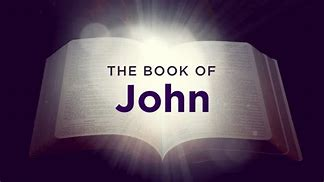Jesus Walks on Water- {Interlinear <Greek>}
6:16 - When {Ὡς<hōs>} • {δὲ<de>} evening {ὀψία<opsia>} came, {ἐγένετο,<ginomai>} his {αὐτοῦ<autos>} disciples {οἱ μαθηταὶ<ho mathētēs>} went down {κατέβησαν<katabainō>} to {ἐπὶ<epi>} the {τὴν<ho>} sea, {θάλασσαν,<thalassa>}
6:17 - got {ἐμβάντες<embainō>} into {εἰς<eis>} a → boat, {πλοῖον<ploion>} and {καὶ<kai>} started {ἤρχοντο<erchomai>} across {πέραν<peran>} the {τῆς<ho>} sea {θαλάσσης <thalassa>} to {εἰς<eis>} Capernaum. {Καφαρναούμ.<Kapharnaoum>} • {καὶ<kai>} It → was {ἐγεγόνει,<ginomai>} now {ἤδη<ēdē>} dark, {σκοτία<skotia>} and {καὶ<kai>} Jesus {ὁ Ἰησοῦς,<ho Iēsous>} had → not yet {οὔπω<oupō>} come {ἐληλύθει <erchomai>} to {πρὸς <pros>} them. {αὐτοὺς<autos>}
6:18 - The {ἥ<ho>} • {τε<te>} sea {θάλασσα<thalassa>} became rough {διεγείρετο.<diegeirō>} because → a → strong {μεγάλου<megas>} wind {ἀνέμου<anemos>} was → blowing. {πνέοντος<pneō>}
6:19 - When → they → had → rowed {ἐληλακότες<elaunō> • <οὖν<oun>} about {ὡς<hōs>} three or four miles, {σταδίους εἴκοσι πέντε ἢ τριάκοντα<stadion eikosin pente ē triakonta>} they → saw {θεωροῦσιν<theōreō>} Jesus {τὸν Ἰησοῦν<ho Iēsous>} walking {περιπατοῦντα <peripateō>} on {ἐπὶ <epi>} the {τῆς <ho>} sea {θαλάσσης <thalassa>} and {καὶ<kai>} coming {γεινόμενον,<ginomai>} near {ἐγγὺς <engys>} the {τοῦ<ho>} boat, {πλοίου <ploion>} and {καὶ<kai>} they → were → frightened. {ἐφοβήθησαν.<phobeomai>}
6:20 - But {δὲ<de>} he {ὁ<ho>} said {λέγει<legō>} to → them, {αὐτοῖς·<autos>} “It • is {εἰμι,<eimi>} I; {ἐγώ<egō>} do → not {μὴ<mē>} be → afraid.” {φοβεῖσθε.<phobeomai>}
6:21 - Then {οὖν<oun>} they → were → glad {ἤθελον<thelō>} to → take {λαβεῖν <lambanō>} him {αὐτὸν<autos>} into {εἰς<eis>} the {τὸ<ho>} boat, {πλοῖον,<ploion>} and {καὶ<kai>} immediately {εὐθέως<eutheōs>} the {τὸ<ho>} boat {πλοῖον<ploion>} was {ἐγένετο<ginomai>} at {ἐπὶ<epi>} the {τῆς<ho>} land {γῆς<gē>} to {εἰς<eis>} which {ἣν<hos>} they → were → going. {ὑπῆγον.<hypagō>}

John 6 is the longest chapter in the New Testament. It provides a rich redemptive-historical perspective on Moses and the central saving act of God in Israel’s history—the exodus. John wants us to see Jesus as the greater Moses and the gospel as the greatest exodus of all. Just as Moses led the Israelites out of bondage in Egypt into the Land of Promise, so Jesus came to lead the pan-national family of God on the ultimate exodus—a journey out of sin and death into the quintessential Promised Land—the new heaven and new earth (Rev. 21:1–5).
Just as the first exodus involved a crisis at sea and the need for supernatural deliverance (Ex. 13:17–14:29), so Jesus responded to his fear-filled disciples, walking to them on the Sea of Galilee, securing their safe delivery to the other side.
The timing of the feeding of the 5,000 is not coincidental. It occurred just before Passover—the meal that inaugurated Israel’s journey through the wilderness. Indeed, Jesus didn’t come merely to provide elements for the Passover meal but to be the Passover meal himself. He is the Lamb of God who takes away the sin of the world (John 1:29). On him we feed and are nourished.
References:
All contents are reposted from ESV.org.
https://www.esv.org/John+6%3A1-21/
“Scripture quotations are from The ESV® Bible (The Holy Bible, English Standard Version®), copyright © 2001 by Crossway, a publishing ministry of Good News Publishers. Used by permission.
All rights reserved.”
Comments